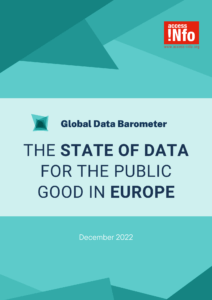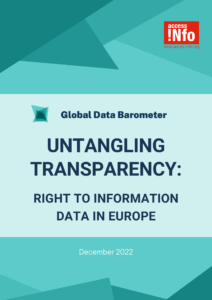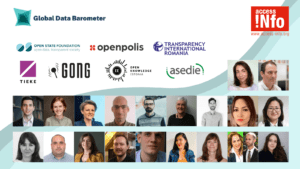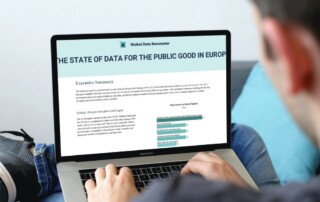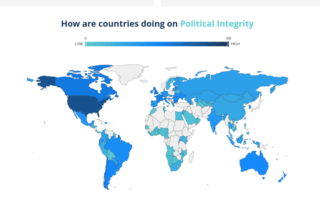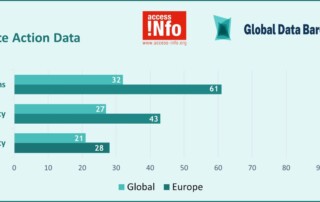
The results of the Global Data Barometer (GDB) are now publicly available. Access Info, as the GDB regional hub for the European Union, brings you the results and reports focused on the European region, including a report focused on the implementation of the right of access to information.
European Countries are Global Data Leaders but Still Much Work to be Done
Overall, the European Union is the strongest region in the world on the state of data. Still, it only received half of the potential score, which means there is a long way to go in adopting regulations, making data available, and doing so following open data standards.
When it comes to the type of data which is made public in Europe, we found that there are relatively high levels of health and Covid-19 data, along with public finance and public procurement data. On the contrary, there is a serious lack of data needed to combat corruption and to tackle climate change.
Dive into the results and read the report ‘The State of Data for the Public Good in Europe’ here:
Europe’s Missing Right of Access to Information Data
The GDB study found that over half of European countries surveyed (11) had no rules requiring collection of data on the implementation of the access to information laws, while in practice, in almost half of the surveyed countries (10) no data at all on implementation was available. Furthermore, in the countries where data was available, it was incomplete, with data on response times often missing, and data not detailed by public body.
Dive into the results and read the report ‘Untangling Transparency: Right to Information Data in Europe’ here:
What is the Global Data Barometer?
The Global Data Barometer is a multi-dimensional study that assessed the state of data in 109 countries. It aims to create a new global benchmark that looks at data governance, capability, availability, and the use and impact of data for the public good.
The data collection was coordinated by 12 regional hubs and it was supported by 6 thematic partners: Open Ownership, Open Government Partnership, Transparency International, GIFT, Land Portal, and Open Contracting Partnership.
The detailed data collection covered the governance of data and evaluated the capacity of government officials to manage data, looking at elements such as management systems and training of public officials, as well as looking at the actual availability of data, and at its use and impact.
There were seven thematic modules:
- Company Information
- Land
- Political Integrity
- Public Finance
- Public Procurement
- Climate Action
- Health & Covid-19
You can read more about the GDB Methodology and all of the 39 indicators in the Global Data Barometer Handbook.
All data collected by the GDB study can be downloaded as open data at the Global Data Barometer website and is available for everyone to explore it, analyse it and reuse it.
Which European Countries are included?
Access Info Europe acted as one of the regional hubs and covered a group of 27 countries, comprising the European region – 20 EU Member States plus the UK – and a selection of other developed economies.
The European Union countries included in the study are: Bulgaria, Croatia, Czechia, Denmark, Estonia, Finland, France, Germany, Greece, Ireland, Italy, Latvia, Lithuania, Malta, Netherlands, Portugal, Romania, Slovakia, Spain, and Sweden.
Access Info has produced a series of specific Europe region reports, which focus on these countries and the United Kingdom (which left the EU in 2020, shortly after the GDB survey was started).
Globally, Access Info coordinated research in Australia, Canada, Israel, New Zealand, Republic of Korea, and the United States. Data about these countries, and all the 109 included in the study, can be found in the Global Data Barometer website.
Team of Researchers
Access Info recruited an excellent team of researchers, both individuals and civil society organisations, to carry out the research in the 27 selected countries.
Get to know them here:
The pilot edition of the Global Data Barometer receives core funding from Canada’s International Development Research Center (IDRC.ca) under grant 109517-001 as part of the Data for Development (D4D.net) program of work. For more information about Global Data Barometer partners, please see www.globaldatabarometer.org
GLOBAL DATA BAROMETER LATEST NEWS
Global Data Barometer: What the EU should do to close the data gap
Madrid, 22 December 2022 – Access Info is today calling on the European Union and EU Member States to act to ensure that data needed for priority issues such as for preventing corruption and tackling climate change, is made public in all countries. This call comes following the publication on 16 December 2022 of the report “The State of
Missing Data Opens the Door to Corruption
Madrid, 9 December 2022 – On the occasion of International Anti-Corruption Day, Access Info is calling on European governments to do more to ensure that the data needed for preventing corruption is both collected and made public. In the wake of the shock ruling from the Court of Justice of the European Union, which has already suspended access to
No Biodiversity: Europe’s Missing Climate Action Data
Madrid, 8 December 2022 – As the UN Biodiversity Conference opens in Montreal, Canada, Access Info has raised concerns about the shortage of biodiversity data with the Global Data Barometer findings being only 43% for biodiversity data in European countries, and only 27% globally. Our research found that no biodiversity data is published online in six (6) European countries,
Not all Expression is Lobbying
Submission to OECD Consultation on Lobbying and Influence Madrid, 6 December 2022 – In its analysis of the draft OECD Recommendation on the regulation of lobbying and influence, Access Info has warned of the risk of some governments using the proposed provisions to limit media freedom and freedom of expression in the name of regulating “influence” and ensuring that
Lack of data to fight corruption and climate change! Find out how EU countries perform in the Global Data Barometer
Join us on 16 December 2022 at 14:00h CET on Zoom for the launch of the European region results of the first Global Data Barometer (GDB). We will be discussing how Europe is the strongest region globally on data for public good, but still only has a middling score of 51% overall. The report reveals which data exists and which
OGP Summit Side Panel: How strong is your right to know?
14 December 2021 – The measurement of the right of access to information is still in its infancy, although there are now some important initiatives, including from UNESCO and the OECD to capture data from governments, whilst civil society projects are developing more in-depth tools to measure transparency in practice. The current state of measurement of the right to information

